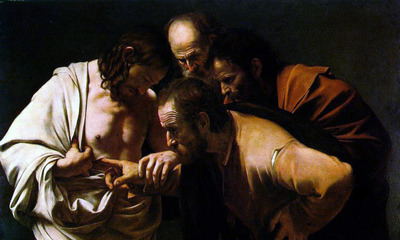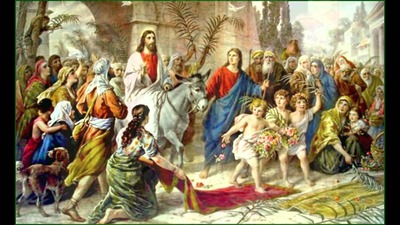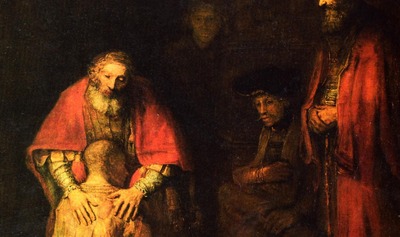April 6, 2025
|by N W
|
0 Comments
|
Deacon Mark, Forgiveness, Lent, Mercy, Obedience, Perseverance, Self-Reflection, Sin
Fifth Sunday of Lent
April 6, 2025 — Year C
by Rev. Mr. Mark De La Hunt, Permanent Deacon
Readings: Is 43:16-21 / Ps 126 / Phil 3:8-14 / John 8:1-11
Today we begin the 5th week of Lent and next week is Holy Week. It kicks off with Palm Sunday and Lent officially ends when Holy Thursday begins the Holy Triduum.
I strongly encourage you to make a Lenten resolution, and whatever sacrifice you need to make, to attend Holy Thursday Mass, Good Friday Liturgy, and Easter Vigil Mass Saturday night. I attended my first Triduum at the age of 25 and it was a conversion moment. It opened my mind and heart to more fully grasp Jesus’ suffering, death, and resurrection. The Triduum helped me make sense of the transition from the austerity of Lent to the joy of Easter.
If you recall, the week before Lent began, I preached on Jesus’ invitation to become more like Him. I suggested doing this through practicing the Virtues and living the Beatitudes with the help of the Holy Spirit’s gifts, which perfect and complete our virtue and make us more docile before God’s will. If you accepted that spiritual challenge or something equally daunting, you likely failed one or more times in the past four weeks.
If you have failed or simply need to dig deeper, I encourage you with the motto of Venerable Bruno Lanteri who founded the Oblates of the Virgin Mary, “Nunc Coepi,” Latin for “Now I begin.” It’s a Catholic way of saying, “Never give up. Never surrender to failure or mediocrity in the spiritual life!” (Venerable is a title for one of “heroic virtue,” under consideration for sainthood.)
We have, if I did my Catholic Lenten math correctly, nine days of Lent left to strive with grace to become more like Jesus. Think of those nine days as a living Lenten novena. Today’s gospel gives us hope to try. Jesus told the woman who committed adultery, “I do not condemn you. Go and do not sin any more.” (Jn 8: 11) Nunc Coepi.
Jesus saw something in that woman that was worth saving. Jesus is like Michelangelo, the great Italian sculptor, who once said, “I saw the angel in the marble and carved until I set him free.” Jesus saw a mini-Christ in the woman who committed the sin of adultery. He sees a mini-Christ in you and me and is chiseling and carving us to free us to be holy enough to one day enter God’s presence in heaven.
Here is a personal story where Jesus revealed this spiritual reality to me. I began my Lent focused on practicing the Virtues and the Beatitudes with the gifts of the Holy Spirit. Ten days in, speaking with Jesus during prayer using Ignatian meditation, He revealed to me a weakness that He hit with His chisel the day before.
The day He spoke of was when I was driving to a doctor’s appointment in Chapel Hill, North Carolina. (You may have driven this trip before. You get off 29 south in Danville and turn left onto highway 86 to Yanceyville, a long rural two-lane road.) For the first time in making that trip, I ended up behind a slow 18-wheeler. I kept looking for opportunities to pass it, with no luck. Anxiety was gnawing at me, as these appointments take months to get. I kept praying, “Jesus I trust in you.” It was Lent and I was on my game!
The truck eventually turned off that road and I was able to speed up and get back on schedule. I thanked Jesus for His grace in staying calm. I made my final turn off the interstate, a turn I have made several times the past four years. But for whatever reason, it did not look right, and I ignored my GPS, looking for a familiar place to turn. I was falling behind schedule. I became very agitated, not only about being late, but also because of this unsettling sense of losing my memory with age. Panic set in.
Praying to St. Joseph for help, I found the medical center. I walked hurriedly through the parking garage, still feeling agitated. An older woman up ahead lost her balance a little and a woman closer to her, offered to help her. The woman who stumbled said she was fine. The helpful woman and I continued on our way, but the helpful woman stopped again, turned around and asked the other lady if she was sure she did not want some help. The lady said she was sure, and we proceeded to the medical center. Wrapped up in my anxiousness to get to my appointment, I never said a word. I did not affirm the helpful lady, nor encourage the one who stumbled.
Now, back to my Ignatian meditation the following day: Jesus asked if the woman in the garage that I failed to help was on my mind? I said, “Yes.” Then I asked somewhat cheekily, “Did you place that slow 18-wheeler in front of me and cause me to lose my sense of direction on the way to my doctor’s appointment?” He said, “Yes.” I felt His divine chisel hit. I was so disappointed in myself, for failing His test, especially because a couple of months earlier, I had preached on saints always being available to help. And even more so, because I was wearing my Roman collar in case someone wanted prayer in the waiting room. I felt the chisel strike again, and cringed thinking what that helpful woman must have thought about Catholic clergy after seeing my indifference to someone in need.
Jesus told me that the helpful woman’s two attempts to lend aid were grace he sent me to try and awaken me. Another strike of His chisel. He said that I tend to focus so much on schedules and tasks that I miss opportunities to love. The divine chisel hurts. But then he encouraged me to begin again. Nunc Coepi. He told me that my focus for Lent was to be always ready to help, even when I am in a rush. He then told me He took care of the lady in need and that He loved me. It was as if He said, “Mark, I do not condemn you. Go and do not sin any more. Be ready to help another even when feeling rushed.”
What is really cool is that a week before my trip, God’s grace began preparing my heart for His divine chisel. Just three days into Lent, due to a history of failure in other areas of my life, I wondered if I was progressing at all in becoming more like Jesus. I told my spiritual director, Fr. Joe, about my failures and asked him if I was progressing. He shared that Michelangelo quote about freeing the angel in the marble and spoke of Jesus using a chisel to sculpt us. Two days later in Confession, the priest mentioned the chisel metaphor. And then on Hallow I heard a St. Maximilian Kolbe quote on Jesus’ chisel. Before this time, I had not heard that metaphor before. (Pay attention when God repeats Himself three times!) Fr. Joe then prayed these words from the French priest and scientist, Father Pierre Teilhard de Chardin:
“Above all, trust in the slow work of God.
We are quite naturally impatient in everything
to reach the end without delay.
We should like to skip the intermediate stages.
We are impatient of being on the way to something
unknown, something new.
And yet it is the law of all progress
that it is made by passing through
some stages of instability—
and that it may take a very long time.
And so I think it is with you;
your ideas mature gradually—let them grow,
let them shape themselves, without undue haste.
Don’t try to force them on,
as though you could be today what time
(that is to say, grace and circumstances
acting on your own good will)
will make of you tomorrow.
Only God could say what this new spirit
gradually forming within you will be.
Give Our Lord the benefit of believing
that his hand is leading you [chiseling],
and accept the anxiety of feeling yourself
in suspense and incomplete.”
Fr. Joe then encouraged me with the reminder that the sculpting Jesus begins in this life is often not finished until after death, in purgatory. There He chisels whatever else we need to be freed from, to be that person we have so long desired to be, that angel in the marble that our Lord has seen from the moment of our conception, that real me and real you that He refuses to condemn IF we seek His forgiveness AND surrender to his divine chisel.
With all of that in mind, listen again to God speaking to us from today’s readings where He invites us to pray with Fr. Bruno Lanteri, “Nunc Coepi. Now I begin.”
From Isaiah on Nunc Coepi: “Remember not the events of the past, the things of long ago consider not; see, I am doing something new!…the people whom I formed for myself.” (Is 18-19;21) (The chiseling began when He made us a new creation in Baptism.)
From the Psalmist on Nunc Coepi: “Those who sow in tears shall reap rejoicing.” (Ps 12: 5) (Chiseling hurts and may even bring tears, but surrendering to it brings about amazingly wonderful transformation.)
From Philippians: St. Paul writes on Jesus not being done chiseling him, “I for my part do not consider myself to have taken possession [of being a mini-Christ]. Just one thing: forgetting what lies behind [our failures] but straining forward to what lies ahead [Nunc Coepi], I continue my pursuit toward the goal, the prize of God’s upward calling, in Christ Jesus.” (Phil 3: 13-14)
As for the gospel, Jesus speaks words that transform the hearts of His enemies from accusation to compassion, from trying to punish to letting go and letting God. Listen to Jesus, this time imagining Him looking directly at you with a stone in your hand. “Let the one among you who is without sin be the first to throw a stone.” (Jn 8:7) Then see His look of love for the person you want to stone and hear Him say, “Has no one condemned you?…Neither do I condemn you. Go, and from now on do not sin any more.” (Jn 8:11) [Now that person can say Nunc Coepi, Now I begin.]
Never forget this truth: Jesus is God and His words have power to make all things new! (Rev 21:5) He said, “Let the one among you who is without sin be the first to throw a stone,” and the angry mob became a compassionate community. He said, “Lazarus come out,” and the dead man came out. “This is my body,” and the bread became His flesh. Just as His words still change the bread into His flesh today, so too did His words do something new in those listening back then and continue to bring about something new in us listening right now. Not only can we see where WE need chiseling, but through His grace, we also can now see the angel in others striving to be freed. With your newly chiseled eyes and heart, be patient and compassionate with one another. And for others and yourself, “Trust in the slow work of God.”
Now, let’s seek the intercession of a saint who was an expert with a chisel and who taught Jesus how to use one too:
St. Joseph, you chiseled wood to make it beautiful and to make it strong enough to withstand the storms and abuse of life. Pray for us that we forget what lies behind and surrender to your carpenter son’s chisel, trusting He will make us new, freed to be like Him. Amen.
Nunc Coepi, my friends. Now we begin!
KEEP READING
 540-586-8988
540-586-8988 










